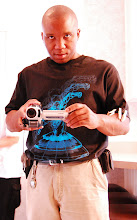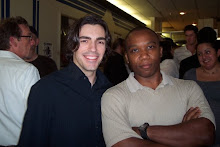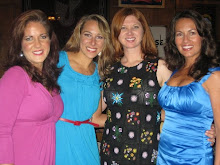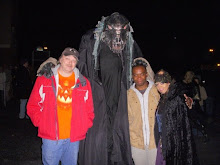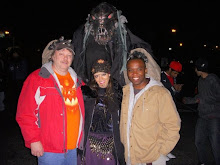
Sometimes I dislike reviewing indie films because I tend to screen earlier versions prior to a released version which has had the luxury of a test screening that would then constitute re-shoots and/or extensive editing. I say this in good faith as many films that I’ve screened could do with some trimming of the fat in order to get to the heart of the story being told.
This could go with the Aware Production release of PAPER BOYS (formerly BOYS OF THE WRECKING CREW), which was filmed in Georgia and had its World Premiere at the famous Plaza Theater, 1049 Ponce De Leon Ave., Atlanta, GA on Saturday, June 20th, 2009. There are some good things to say about the film and some bad but I give indie films a little more leeway (from Hollywood films) because of their unique nature of sometimes reveling in more risqué and unconventional stories. This is such a film.
The film begins with a subtle bang as after a young couple appear to be in the throws of love the woman commits suicide and the young man Sean is left broken. Sean’s (Louis Lavdas) way of dealing with the situation is to return to his job as a paper boy solicitor who goes door-to-door selling newspaper subscriptions. He is just one of a crew of young men guided by Ray (Chris Whitley) who try to make a living at this day in and day out. Sean has more to deal with then just a lover who killed herself but he also is haunted by his estranged relationship with his abusive father, he’s addicted to just about every drug known to mankind, and he’s having a sexual identity crisis. That’s a lot for one person to deal with and therein lies the biggest problem with the film.
The film has many technical issues as in many shots that linger on the screen for far longer then they should – one scene in particular is a POV shot of Sean in a drug induced state walking through a house in which he just participated in an orgy, not to mention that several shots are handheld and pan from one actor to another with no finesse or control and sometimes it’s even on background characters who aren’t even participating in the conversation at hand. Many of these incidents could be fixed if they were trimmed or cut altogether.
Technical issues aside (since many indie films suffer from this) I do have to say that the post-sound is excellent for the most part. There are very few incidents where the volume and quality were not at top form. Since sound is one of the biggest problems with indie productions it’s good to hear that the filmmakers took care with the post-sound work on this film.
Getting back to the plot of the film, PAPER BOYS suffers from trying to say too much with so little. Sean’s plight as an abused kid with a dead-in job that only helps to fuel his drug habit because his girlfriend killed herself and he’s not sure whether he’s gay or straight just makes it seem like the entire world is against him and he should just go ahead and join his girlfriend in a suicide pact. The story is best when it focuses on Sean’s inability to cope with the childhood abuse done to him by his father heavily handled in many of the flashback sequences (some of which are the most compelling in the film). If the film had stuck with this as it’s background and conflict and then handled Sean’s inability to cope through either drug abuse of sexual identity then the film’s theme might have come off stronger but the issues are defused because no time is given to any one of Sean’s problems. He just seems to be a kid with too many problems. This inability in the film’s focus also contributes to its lackluster and unsatisfactory ending (which I won’t give away here) but needless to say the film’s climax is all too easily solved and there is no satisfying closure with Sean’s character in terms of any of the problems that the film presents that he has. They just all seem to nicely go away.
The film’s climax is the real let down as it opts for a “feel good” ending that is not warranted due to everything that came before it not to mention that it is 15 minutes too long. The film wants to say so many things about sexual identity, drug abuse, physical abuse, and even suicide yet never really says anything about any of them as the message is lost in translation amongst the film’s other problems and the “happy ending.”
The film does have some questionable performances amongst its huge cast of Georgia actors but there are some great moments with Joe (Justin Riddick), who steals many of the scenes in the film with his womanizing ways and picture-perfect life (not mention lifestyle) but Whitley as Sean’s crew leader of the paper boys and in a sense “older brother” also gives a noteworthy performance.
Writer, producer, and director Bryan E. Hall has a great many cast and location to contend with on this film, which is good for the film as he doesn’t rely on the single location film shoot that can plague many an indie film. There are many great comedic moments in the film that release some of the tension from the heavy-handed subject matter (and sometimes I wish there was more). Overall PAPER BOYS is a film that’s sometimes over convoluted with what its trying to say that needs a little trimming and cutting in some places but it’s not a film completely devoid of any redeeming value.
This could go with the Aware Production release of PAPER BOYS (formerly BOYS OF THE WRECKING CREW), which was filmed in Georgia and had its World Premiere at the famous Plaza Theater, 1049 Ponce De Leon Ave., Atlanta, GA on Saturday, June 20th, 2009. There are some good things to say about the film and some bad but I give indie films a little more leeway (from Hollywood films) because of their unique nature of sometimes reveling in more risqué and unconventional stories. This is such a film.
The film begins with a subtle bang as after a young couple appear to be in the throws of love the woman commits suicide and the young man Sean is left broken. Sean’s (Louis Lavdas) way of dealing with the situation is to return to his job as a paper boy solicitor who goes door-to-door selling newspaper subscriptions. He is just one of a crew of young men guided by Ray (Chris Whitley) who try to make a living at this day in and day out. Sean has more to deal with then just a lover who killed herself but he also is haunted by his estranged relationship with his abusive father, he’s addicted to just about every drug known to mankind, and he’s having a sexual identity crisis. That’s a lot for one person to deal with and therein lies the biggest problem with the film.
The film has many technical issues as in many shots that linger on the screen for far longer then they should – one scene in particular is a POV shot of Sean in a drug induced state walking through a house in which he just participated in an orgy, not to mention that several shots are handheld and pan from one actor to another with no finesse or control and sometimes it’s even on background characters who aren’t even participating in the conversation at hand. Many of these incidents could be fixed if they were trimmed or cut altogether.
Technical issues aside (since many indie films suffer from this) I do have to say that the post-sound is excellent for the most part. There are very few incidents where the volume and quality were not at top form. Since sound is one of the biggest problems with indie productions it’s good to hear that the filmmakers took care with the post-sound work on this film.
Getting back to the plot of the film, PAPER BOYS suffers from trying to say too much with so little. Sean’s plight as an abused kid with a dead-in job that only helps to fuel his drug habit because his girlfriend killed herself and he’s not sure whether he’s gay or straight just makes it seem like the entire world is against him and he should just go ahead and join his girlfriend in a suicide pact. The story is best when it focuses on Sean’s inability to cope with the childhood abuse done to him by his father heavily handled in many of the flashback sequences (some of which are the most compelling in the film). If the film had stuck with this as it’s background and conflict and then handled Sean’s inability to cope through either drug abuse of sexual identity then the film’s theme might have come off stronger but the issues are defused because no time is given to any one of Sean’s problems. He just seems to be a kid with too many problems. This inability in the film’s focus also contributes to its lackluster and unsatisfactory ending (which I won’t give away here) but needless to say the film’s climax is all too easily solved and there is no satisfying closure with Sean’s character in terms of any of the problems that the film presents that he has. They just all seem to nicely go away.
The film’s climax is the real let down as it opts for a “feel good” ending that is not warranted due to everything that came before it not to mention that it is 15 minutes too long. The film wants to say so many things about sexual identity, drug abuse, physical abuse, and even suicide yet never really says anything about any of them as the message is lost in translation amongst the film’s other problems and the “happy ending.”
The film does have some questionable performances amongst its huge cast of Georgia actors but there are some great moments with Joe (Justin Riddick), who steals many of the scenes in the film with his womanizing ways and picture-perfect life (not mention lifestyle) but Whitley as Sean’s crew leader of the paper boys and in a sense “older brother” also gives a noteworthy performance.
Writer, producer, and director Bryan E. Hall has a great many cast and location to contend with on this film, which is good for the film as he doesn’t rely on the single location film shoot that can plague many an indie film. There are many great comedic moments in the film that release some of the tension from the heavy-handed subject matter (and sometimes I wish there was more). Overall PAPER BOYS is a film that’s sometimes over convoluted with what its trying to say that needs a little trimming and cutting in some places but it’s not a film completely devoid of any redeeming value.
